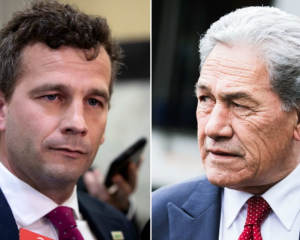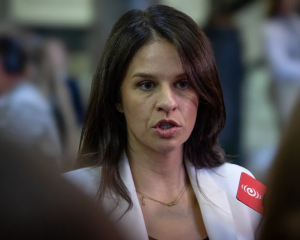Here's how cigarette packs could soon look - a standard package with gruesome warning image.
The packaging was revealed at a smokefree event on Wellington's waterfront and could be rolled out early next year.
The prop design at the event is not the final design - the Government will now consult on plain packaging, including design for packs.
Associate Health Minister Peseta Sam Lotu-Iiga has released draft regulations and a consultation document which aims to standardise the look of cigarette packs.
"The design and appearance of cigarette packets are powerful marketing tools for vendors. The Government is proposing to use the standard brown-green packaging which is similar to what is used in Australia," Mr Lotu-Iiga said.
"We're proposing that mandatory health warnings will cover at least 75 per cent of the front of the packs and all tobacco imagery will be removed. Brand names will be allowed but regulations will standardise how and where the printing is."
Plain packaging is likely to be in place early next year - but officials need better information before deciding if e-cigarettes can be made legal, Prime Minister John Key says.
Tax on tobacco will be significantly hiked and the Government will forge ahead with plain packaging, despite a legal risk backed by tobacco giants.
"Nothing kills you with greater predictability than smoking," Mr Key said of the plain-packaging change.
"It will take some time before you actually see it on the shelves [plain packaging]. My expectation would be early next year."
Certain tobacco researchers are urging the removal of restrictions on buying e-cigarettes containing nicotine.
Nicotine patches and gum can be bought, but nicotine e-cigarette liquid must be bought from overseas. Other countries, like the UK, allow the products to be sold in supermarkets and dairies.
However, there are fears young people could use the devices. Mr Key said he had received advice on the usefulness of e-cigarettes and vaping.
"The advice I'm getting so far is that there may be a role for e-cigarettes in terms of people transitioning away from smoking. But I think the health impacts are very unknown at this point. So there is some concern, at least by officials, that there may be long-term health impacts.
"We don't have enough good data at this point to make a call on that. In the short term, people certainly are using them to transition. That might be a helpful way of weaning off cigarettes, but long-term we'll need to get better advice and data."
Maori Party co-leader Marama Fox told the smokefree gathering that politicians should lead by example and make the Parliamentary precinct smokefree.
That led to a crack from Labour MP Rino Tirikatene, who tweeted that the Maori Party and their "mates" National were "slowly turning Aotearoa into a kuia state".
Labour leader Andrew Little said he needed better information before making a call on whether e-cigarettes should be made available. Plain packaging was supported by Labour.
New Zealand had been keeping an eye on the outcome of legal challenges against Australia's plain packaging, one from tobacco firm Philip Morris and another from tobacco-producing countries via the World Trade Organisation (WTO).
Australia won the case against Philip Morris in December.
The WTO challenge is ongoing, but Mr Key has said he received advice late last year that the Government was on a "firm footing" to progress plain packaging because several other countries, including the UK and Ireland, had introduced it.
These countries did not face a challenge under the WTO.
The Trans Pacific Partnership (TPP), signed on February 4, also allows tobacco-control measures, so New Zealand could advance anti-smoking policies without risking a legal challenge.
A pack of 20 cigarettes will increase from about $20 now to around $30 in 2020 after hefty excise increases were announced as part of last week's Budget.
The tax on tobacco will rise by 10 per cent on January 1 each year for the next four years.
That is expected to bring in an extra $425 million in tax over that period.
It will affect the about 15 per cent of adult New Zealanders who smoke each day - about 550,000 people.
That rate increases to 35 per cent for Maori, and 22 per cent for Pacific people.
The tax hikes are part of measures designed to make New Zealand smoke-free by 2025, a key goal of the Maori Party.
Asked if that was realistic, Mr Key said his confidence was increasing, as there was increasing momentum behind the smokefree movement.
















